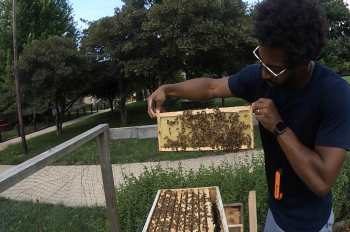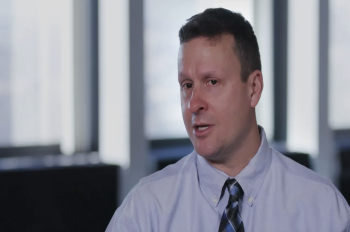Engineering Student Wins NSF Graduate Fellowship for STEM Research

The National Science Foundation has awarded Armour College of Engineering’s Austeja Staneviciute (BME ’20, M.S. CHE) with its prestigious graduate research fellowship, based on demonstrated potential for significant achievements in science and engineering research.
The NSF Graduate Research Fellowship Program recognizes and supports outstanding graduate students in NSF-supported science, technology, engineering, and mathematics disciplines who are pursuing research-based master's and doctoral degrees at accredited institutions. As outlined on the GRFP website, the award provides three years of financial support within a five-year fellowship period.
“The National Science Foundation Graduate Research Fellowship provides great support for my pursuit to improve as an innovator and engineer. As I begin my journey as a Ph.D. candidate, the fellowship will allow me to continue my research project that utilizes methods that have not been previously explored,” says Staneviciute, adding that she dreams of helping people in need through advancements in scientific innovation.
Her current research is in the cell and tissue engineering field, focusing on the regeneration of the bone and cartilage interface. She explains that standard treatments for these defects in osteoarthritis patients improve clinical outcomes but are not curative therapies. Her research goal is to create a 3D tissue model that influences mesenchymal stem cells to differentiate into bone and cartilage cell lineages.
The fellowship will help Staneviciute achieve her professional and personal goals.
“I seek to become a globally engaged researcher in the field of stem cell therapies and become a mentor that supports women and young students in STEM. Also, the NSF fellowship will help me expand my network, and I hope one day to initiate a research collaboration with scientists from my homeland, Lithuania.”
Staneviciute plans to begin her doctoral program at Illinois Tech in fall 2020 and will further advance her bone and cartilage research project along with the support from her Department of Biomedical Engineering mentors: Marcella Vaicik, research assistant professor of biomedical engineering, and Georgia Papavasiliou, professor of biomedical engineering.
“Illinois Tech has played a critical role in my development as an engineer and researcher. I am truly grateful to my professors who provided career advice and allowed me to participate in research projects since I was a freshman,” adds Staneviciute.
The next stage of the study is to design a 3D tissue model that has combinatorial gradients of various mechanical and chemical properties. Staneviciute hopes her findings can contribute toward the development of a minimally invasive cellular therapy for osteoarthritis patients.




